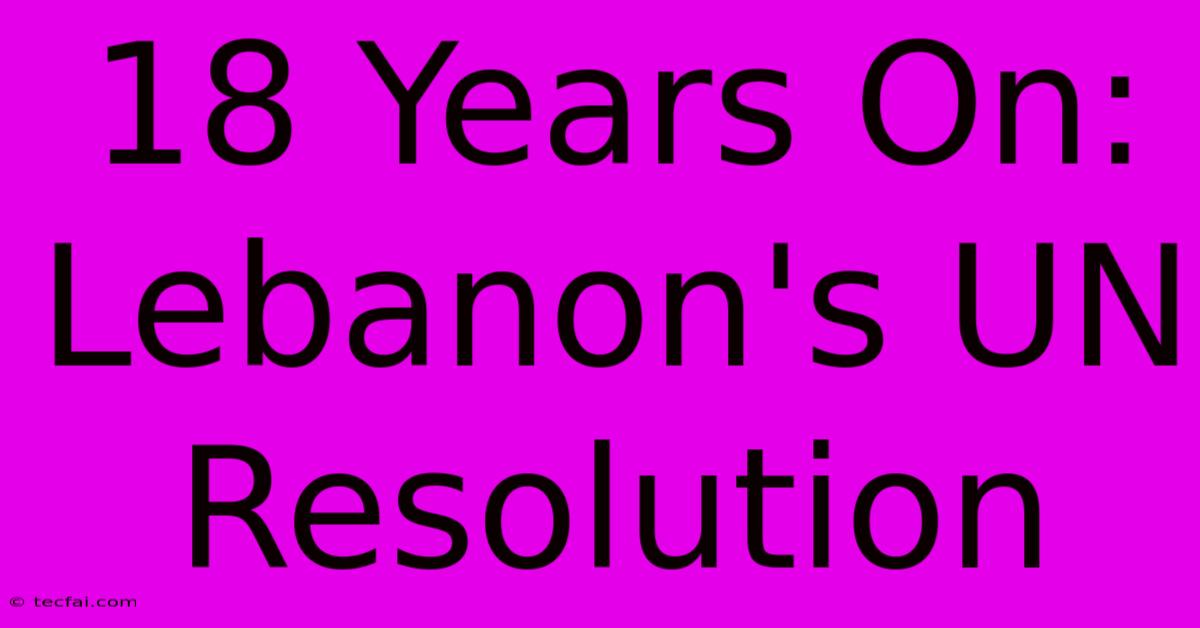18 Years On: Lebanon's UN Resolution

Discover more detailed and exciting information on our website. Click the link below to start your adventure: Visit Best Website tecfai.com. Don't miss out!
Table of Contents
18 Years On: Lebanon's Struggle with UN Resolution 1559
Eighteen years after its adoption, the impact of UN Security Council Resolution 1559 on Lebanon remains a complex and contested issue. Passed unanimously on September 2, 2004, the resolution called for the disarmament of all Lebanese militias, including Hezbollah, and the strengthening of the Lebanese state's authority throughout its territory. While the resolution aimed to foster peace and stability, its legacy is a multifaceted one, marked by both progress and persistent challenges.
The Aims of Resolution 1559: A Look Back
Resolution 1559's core objectives were straightforward: to end the presence and influence of foreign forces in Lebanon, primarily Syria, and to disarm all militias operating outside the control of the Lebanese government. The resolution specifically highlighted the need for the Lebanese government to exercise its full sovereignty over its entire territory. This was a direct response to the long-standing Syrian military presence and the significant influence of armed groups like Hezbollah, which had exerted considerable power within the country.
The international community, particularly the United States and France, saw Resolution 1559 as crucial for restoring Lebanon's sovereignty and stability, paving the way for a more democratic and peaceful future. The hope was to create a unified Lebanon, free from external interference and dominated by a legitimate, centrally governed state.
Partial Successes and Lingering Challenges
While the resolution undeniably contributed to some positive developments, its complete implementation remains elusive. The Syrian withdrawal from Lebanon in 2005, a significant step towards fulfilling one of the resolution's key objectives, can be partially attributed to the international pressure generated by Resolution 1559. This withdrawal marked a pivotal moment in Lebanon's history, signaling the end of a long period of Syrian tutelage.
However, the complete disarmament of all Lebanese militias, including Hezbollah, has remained a significant point of contention. Hezbollah, a powerful Shia Islamist political party and militant group, continues to maintain a substantial military force, presenting a complex challenge to the Lebanese government and the international community. Their continued presence, while controversial, is interwoven into the country's political and security landscape.
The Geopolitical Context: A Complex Web of Influence
The failure to fully implement Resolution 1559 can be attributed to several factors. The intricate regional dynamics, particularly the ongoing conflicts in the surrounding region, have made it difficult to enforce the resolution's provisions. Hezbollah's strong support base within the Lebanese Shia community, coupled with its role in resisting Israeli influence, adds another layer of complexity.
Furthermore, the internal political divisions within Lebanon have hindered the government's ability to assert its authority effectively over all parts of the country. The ongoing political instability and lack of a strong, unified national consensus have significantly hampered progress towards implementing the resolution's objectives fully.
The Enduring Legacy: A Path Forward?
Despite the incomplete implementation of Resolution 1559, its legacy continues to shape Lebanon's political and security environment. The resolution serves as a constant reminder of the international community's expectations concerning Lebanon's sovereignty and stability. The ongoing debates and discussions surrounding the resolution highlight the continued need for a comprehensive approach to addressing the complex challenges facing Lebanon.
Looking ahead, finding a sustainable solution requires a multifaceted approach, including addressing the root causes of political instability, fostering national unity, and engaging all stakeholders in a meaningful dialogue. A lasting resolution to the issues raised by Resolution 1559 will require a concerted effort from the Lebanese government, regional actors, and the international community. It's a long and complex path, but one that is crucial for Lebanon's future.

Thank you for visiting our website wich cover about 18 Years On: Lebanon's UN Resolution. We hope the information provided has been useful to you. Feel free to contact us if you have any questions or need further assistance. See you next time and dont miss to bookmark.
Featured Posts
-
Sheffield Utd Vs Oxford Utd Live Score
Nov 27, 2024
-
St Johnstone Match Aberdeen Alcohol Plan Scrapped
Nov 27, 2024
-
Bissonnette Attacked In Arizona Altercation
Nov 27, 2024
-
Barclays Cuts Mortgage Rates Wednesday
Nov 27, 2024
-
Trump Tariffs Hit Nzd Usd
Nov 27, 2024
